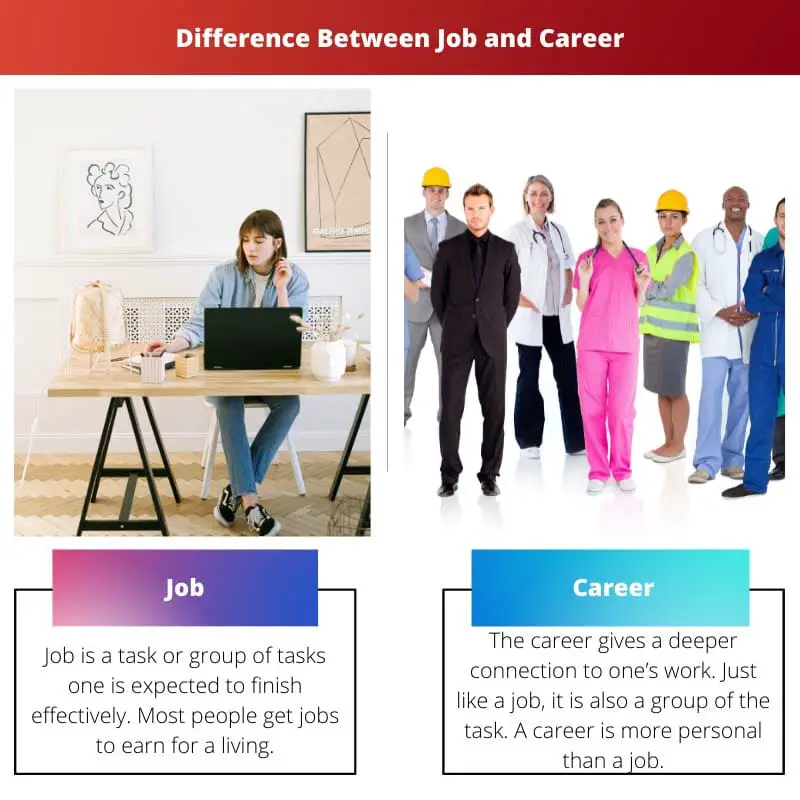A job typically refers to a specific role or position undertaken for monetary compensation, often with limited long-term commitment or advancement prospects. On the other hand, a career entails a series of connected employment opportunities, where skills and experiences are developed over time, leading to personal and professional growth and fulfillment.
Key Takeaways
- A job is a specific role or position a person holds temporarily in exchange for payment.
- A career is a long-term occupation or profession that a person pursues to advance and grow in that field.
- Jobs may not necessarily be related to long-term career goals, while careers involve growth and development in a specific field.
Job vs Career
The difference between a job and a career is how a person treats their work. If a person feels like they are doing the work to get their salary, they consider it a job. But if a person feels like doing the work gives them a sense of fulfilment and helps them grow, then they consider it their career.

Below is a deeper understanding of the differences between a job from a career.
Comparison Table
| Feature | Job | Career |
|---|---|---|
| Definition | Specific role or position within an organization | A journey of work-related experiences and growth |
| Focus | Earning a living, fulfilling specific tasks | Personal and professional development, long-term goals |
| Duration | Can be short-term, temporary, or contractual | Long-term, aiming for progression and advancement |
| Motivation | Primarily financial needs and security | Passion, purpose, fulfillment, and satisfaction |
| Skills & Education | Requires specific skills and training for the role | May require additional education and continuous learning |
| Progression | Limited upward mobility within the same role | Opportunity for advancement, promotion, and changing roles |
| Example | Working as a cashier in a grocery store | Being a doctor, starting your own business, becoming a teacher |
What is a Job?
A job can be defined as a specific task, duty, or role performed by an individual in exchange for monetary compensation. It typically involves a set of responsibilities and expectations determined by an employer or organization.
Characteristics of a Job
- Monetary Compensation: One of the primary features of a job is the compensation received in return for the work performed. This compensation can take various forms, including salary, wages, bonuses, or other benefits.
- Defined Scope and Duration: A job usually has a specific scope of responsibilities and a defined duration, whether it’s temporary, part-time, or full-time. The tasks and duties associated with the job are outlined by the employer.
- Limited Commitment: Jobs often entail a limited commitment from both the employee and the employer. While the employer expects the employee to fulfill their responsibilities satisfactorily, there may not be a long-term commitment beyond the duration of the employment contract.
- Transactional Relationship: The relationship between an employee and their job can be viewed as transactional, primarily focused on the exchange of labor for compensation. The employee provides their skills and services to fulfill the job requirements, and the employer compensates them accordingly.
Examples of Jobs
- Retail Sales Associate: Responsibilities may include assisting customers, managing inventory, and processing transactions.
- Customer Service Representative: Duties may involve addressing customer inquiries, resolving complaints, and providing product or service information.
- Data Entry Clerk: Tasks typically include entering and updating data in computer systems, maintaining accuracy and efficiency in data processing.

What is Career?
A career can be described as a lifelong journey of professional and personal development pursued through a series of connected employment opportunities, experiences, and achievements in a chosen field or industry.
Characteristics of a Career
- Long-Term Development: Unlike a job, a career involves a long-term commitment to continuous learning, skill development, and advancement within a particular field or profession. Individuals strategically plan and navigate their career paths to achieve their professional goals and aspirations.
- Personal Fulfillment and Growth: A career offers opportunities for personal fulfillment and growth, allowing individuals to pursue their passions, interests, and values through their work. As individuals progress in their careers, they often seek roles that align with their strengths, values, and aspirations, leading to greater job satisfaction and fulfillment.
- Professional Advancement: Career progression involves moving up the career ladder through promotions, increased responsibilities, and leadership opportunities. Individuals actively seek out opportunities for advancement, whether within their current organization or by transitioning to new roles or employers that offer greater challenges and opportunities for growth.
- Continuous Learning and Adaptation: Successful careers are built on a foundation of continuous learning, adaptation, and skill development. Individuals invest in acquiring new knowledge, honing their skills, and staying abreast of industry trends and advancements to remain competitive and relevant in their chosen field.
Examples of Careers
- Software Developer: Starting as a junior developer, individuals may progress to senior developer, software architect, or managerial roles, continuously enhancing their coding skills, technical expertise, and leadership abilities.
- Registered Nurse: Beginning as a staff nurse, individuals can advance to roles such as nurse manager, nurse educator, or nurse practitioner, expanding their clinical knowledge, patient care skills, and leadership capabilities.
- Marketing Professional: Starting in entry-level marketing positions, individuals may advance to roles such as marketing manager, director of marketing, or chief marketing officer, developing expertise in various marketing strategies, analytics, and leadership skills.

Main Differences Between Job and Career
- Scope and Duration:
- A job typically has a defined scope of responsibilities and a limited duration, often temporary or part-time.
- A career encompasses a lifelong journey of professional development, involving continuous learning, skill enhancement, and long-term commitment.
- Focus and Commitment:
- A job focuses primarily on fulfilling specific tasks or duties in exchange for monetary compensation.
- A career involves a deeper commitment to personal growth, professional advancement, and achieving long-term goals and aspirations within a chosen field or industry.
- Opportunities for Advancement:
- Jobs may offer limited opportunities for advancement within a particular role or organization.
- Careers provide avenues for progression through promotions, increased responsibilities, leadership roles, and skill development, enabling individuals to advance their professional trajectories over time.
- Personal Fulfillment and Satisfaction:
- Jobs may offer immediate financial benefits but may not always align with an individual’s long-term career goals or personal interests.
- Careers offer opportunities for personal fulfillment, job satisfaction, and alignment with one’s passions, values, and aspirations, contributing to a sense of purpose and fulfillment in one’s professional life.


The article’s detailed explanation of what constitutes a job and a career adds clarity and depth to readers’ understanding of these concepts. It provides thoughtful insights into the dynamics of employment and professional growth.
I completely agree. The emphasis on career development and the differences in skills transferability between jobs and careers enriches the discussion, offering valuable perspectives for readers.
Absolutely! The article’s focus on the types of jobs and the job search process provides practical guidance for individuals navigating the job market, making it a highly valuable resource.
This article provides valuable insights into distinguishing between a job and a career. The key takeaways are clear and informative, helping readers understand the differences more effectively.
Absolutely, the comparison table adds a structured and systematic approach to understanding the differences between a job and a career.
Exactly, it’s crucial to recognize the distinctions between a job and a career to make informed decisions about our professional paths.
This article provides a comprehensive understanding of careers, encompassing the multifaceted nature of a person’s journey through learning and work. The comparison table and examples are highly enlightening.
Absolutely. The focus on skill development and fulfillment offers valuable insights, encouraging readers to reflect on their professional paths and goals.
The article provides a comprehensive understanding of what defines a career, encompassing the multifaceted aspects of professional growth and development. The examples and comparison table offer valuable insights into distinguishing between a job and a career.
Absolutely! The article effectively captures the essence of a career journey, offering practical guidance for individuals at various stages of their professional aspirations.
The content effectively elucidates the nuances of a job and a career, offering a clear and systematic comparison that enhances readers’ understanding of these concepts. It’s a highly informative resource for individuals navigating the professional landscape.
I completely agree. The article’s emphasis on fulfillment, decision-making autonomy, and transferability of skills adds depth to the discussion, making it a valuable resource for readers.
This content provides an in-depth analysis of jobs and careers, covering various aspects like scope, motivation, and skills development. It’s an excellent resource for individuals at different stages in their professional journey.
I completely agree. The content also highlights the importance of job satisfaction and career development, which are essential considerations for long-term professional success.
The distinction between jobs and careers is clearly articulated, emphasizing the critical factors of fulfillment, skill development, and long-term commitment. It’s a thought-provoking read for anyone contemplating their professional aspirations.
I totally agree. The examples provided in the article effectively illustrate the variations between a job and a career, allowing readers to relate to real-world scenarios.
The article’s detailed comparison table effectively captures the differences between jobs and careers, shedding light on their respective focus, scope, and long-term implications. It’s an enriching read for anyone considering their professional pursuits.
I couldn’t agree more. The article’s in-depth exploration of job characteristics provides a nuanced understanding, guiding individuals in making informed decisions about their career paths.
Absolutely! The article offers valuable insights into the significance of job satisfaction and career progression, offering practical guidance for individuals at different stages of their professional journey.
The comprehensive explanation of job characteristics, types of jobs, and recruitment processes offers readers an encompassing view of the employment landscape. It’s a valuable guide for understanding the dynamics of the job market and career development.
Absolutely! The content effectively highlights the significance of job satisfaction and its relationship to career development, making it a compelling read for individuals seeking professional advancement.
Exactly! The focus on job search and recruitment processes provides practical insights into navigating the employment landscape effectively.
The article effectively outlines the characteristics of a job, job search and recruitment, as well as the significance of job satisfaction and career development. It’s a comprehensive resource for individuals navigating the job market.
Absolutely, the detailed explanation of job search and recruitment processes provides a comprehensive understanding of the employment landscape.
I couldn’t agree more. The article’s focus on career development is particularly insightful, shedding light on the importance of continuous learning and professional growth.